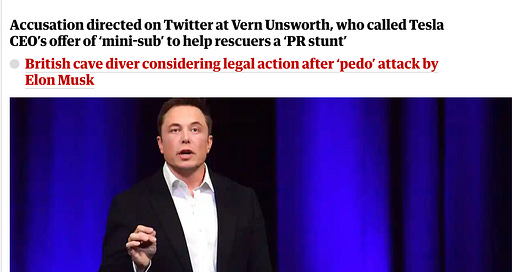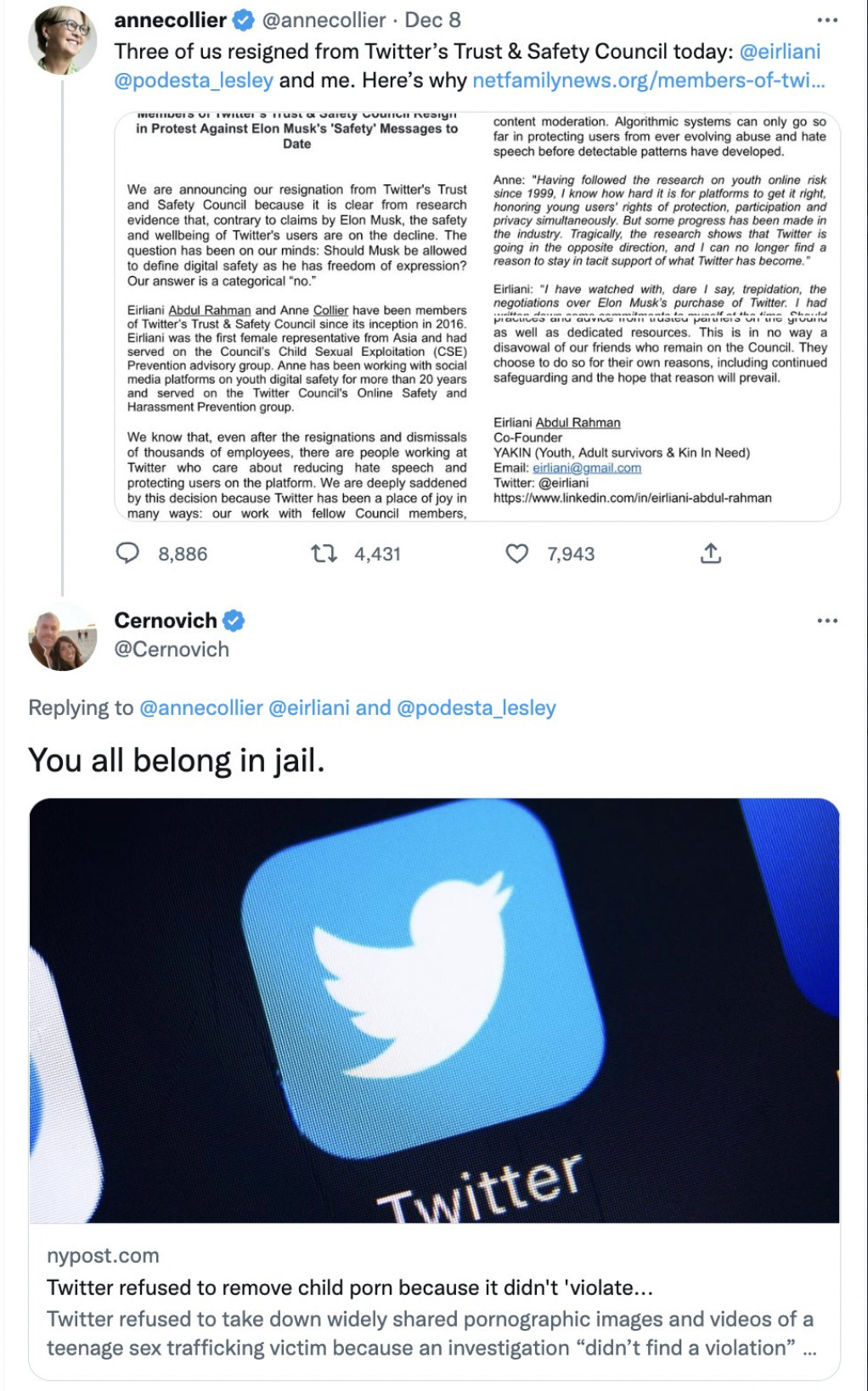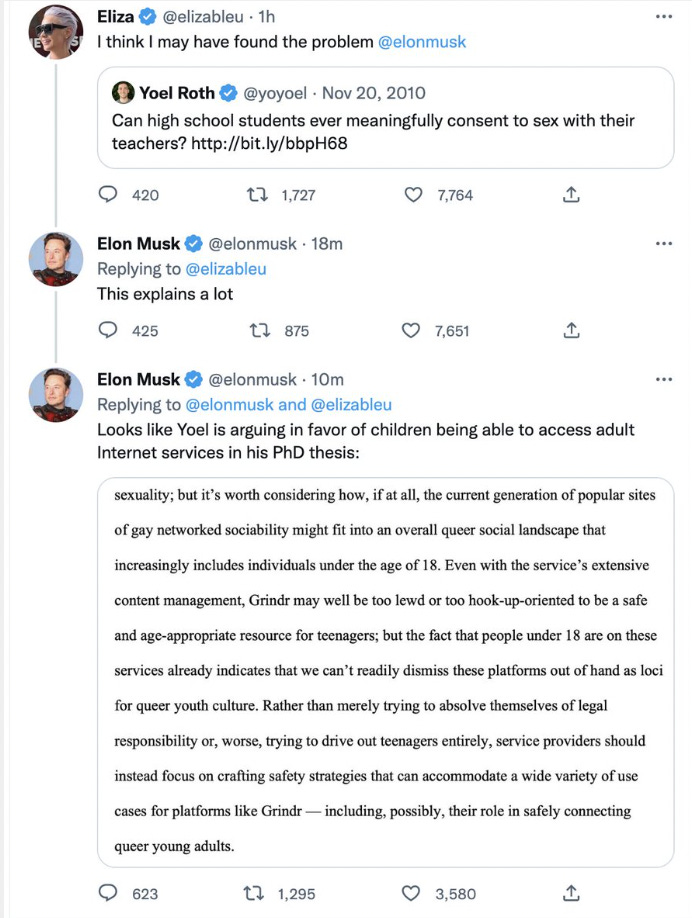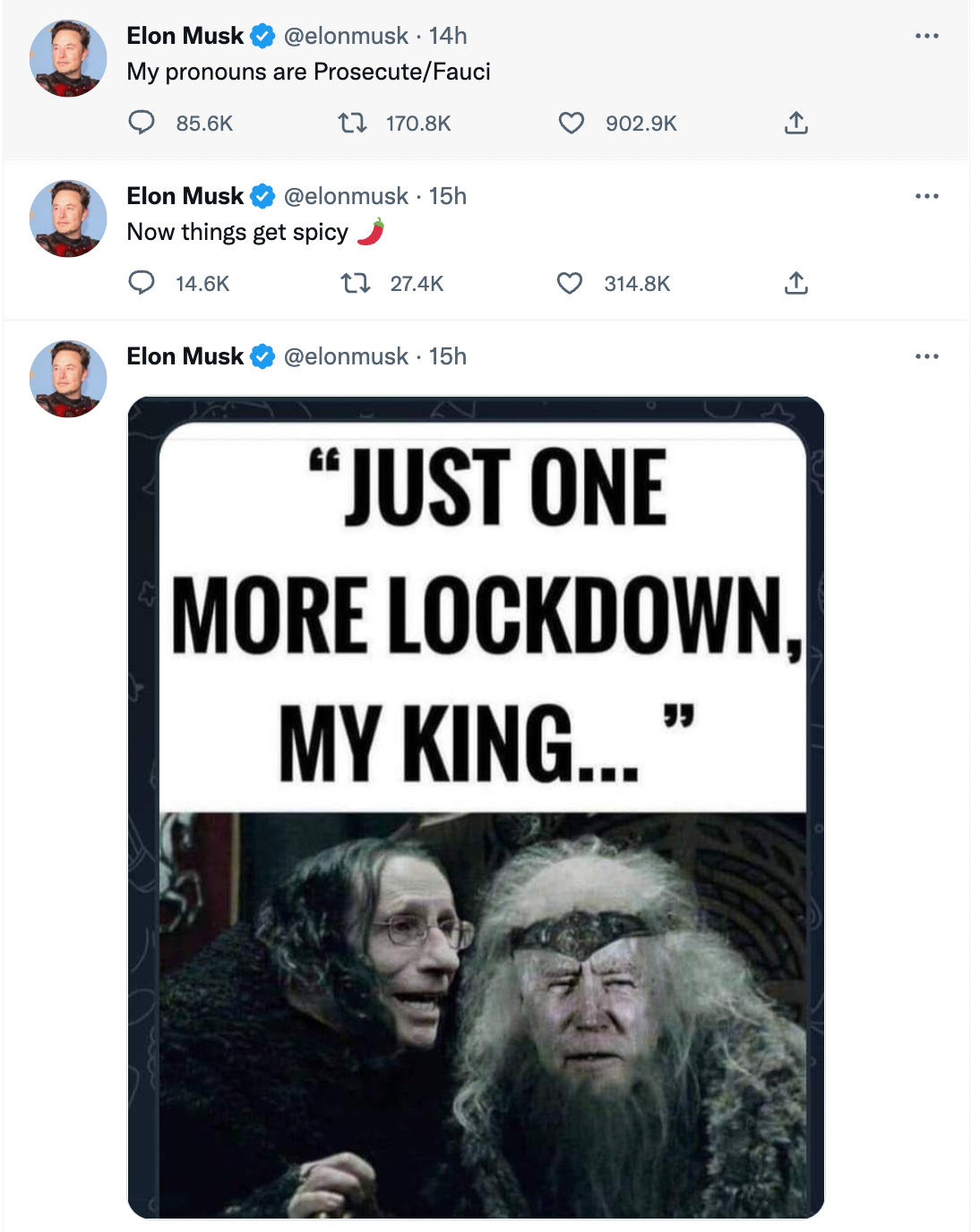Elon Musk would like to sell you a used conspiracy theory
Why Musk calling a cave-diver "pedo guy" was a warning
In 2018, when a group of teens were trapped in a cave in Thailand, Elon Musk offered a splashy solution: he would send a tiny submarine that could rescue them. His idea was mocked as a PR stunt by some, including Vernon Unsworth, an experienced cave diver who advised the successful rescue. Musk called Unsworth a “pedo guy” on twitter to his then 20 million followers, repeated the claims after deleting the original tweet, and told a reporter that Unsworth was a “child rapist.”
Musk ultimately won a defamation case by claiming his accusation was not meant to be taken literally. But the incident was revealing of Musk in ways that are playing out now that he is primary owner of Twitter.
Musk wanted to insert himself as the hero in a story that captivated the world. When his actions were mocked, he lashed out, using the vilest smear. Angry at the public criticism that followed, he gravitated towards followers and grifters who applauded him, including a conman to whom he paid $50,000 to investigate Unsworth.
Musk has been criticized for his erratic leadership at Twitter, with one conspicuous exception: right-wing conspiracy grifters praise him as a hero, perceiving a figure that will allow them to assert unfettered influence on Twitter. And Musk gravitates towards the applause, replying to them and responding their suggestions about how to run the website. We are starting to see consequences for Twitter itself.
The paranoid style moves from the fringes to the center
The last decade has been defined by an effort of adherents of what Richard Hofstadter once dubbed “the paranoid style” of American politics to move from the fringes to the center. They have been more successful than not. Starting with birtherism, they have largely captured one American political party, and some American media institutions. And now they are poised to capture Twitter.
Since 2020, a handful of conspiracy theories have animated the US right. One is around Covid, another is around the 2020 election, and a third is around child-sex trafficking or child-abuse, sometimes under label of QAnon. There are multiple sub-narratives within each domain, some of which more mainstream, but they contain the classic conspiracy trademarks: an elite cabal of the wealthy and powerful are covering up a great crime against the people.
The conspiracy theorists believe they are victims, and that institutions that victimized them are corrupt and must be cleansed. This includes government, but also Twitter. What is increasingly clear is that Musk shares these views, and will use ownership of Twitter to validate them. He is simultaneously writing a new QAnon chapter, calling for the prosecutions of Fauci, while telling right-wingers that the election was rigged against them. His rhetorical boosting of free speech has been revealed as boosterism for conspiracy theories.
The “Twitter Files”
His “Twitter files” - releases of internal Twitter employee deliberation about how to deal with misinformation and incitement on the site - center on how Twitter managed Hunter Biden’s laptop, Trump’s claims about the 2020 election and subsequent incitement of a coup, and, it is promised, coverage of Covid.
Musk insists on transparency as his motivation, but is only releasing this information to hand-picked allies who share his views. For this reason Eric Levitz of New York Magazine characterized "the Twitter Files as “an egregious example of the very phenomenon it purports to condemn — that of social-media managers leveraging their platforms for partisan ends.”
What the files reveal is…not very much. Most of the material shared is already known, or entirely predictable. The Twitter Files are only scandalous if a) you think that the misinformation on the site was not a problem and b) deamplifying misinformation or banning those pushing it is the bigger problem. Which speaks to the fact that they only make sense if you are willing to adopt the paranoid style of reasoning. But as owner of Twitter, Musk is telling more and more people that they should adopt that worldview.
The 2020 election
Let’s take a couple of examples, more or less randomly drawn from those that came across my feed. Here Matt Taibbi, one of Musk’s chosen interpreters, describes the President of the United States telling the public, at a time that many are using mail-in ballots to vote, that there are “Big problems and discrepancies with Mail In Ballots all over the USA” as “a fairly anodyne Trump tweet.”

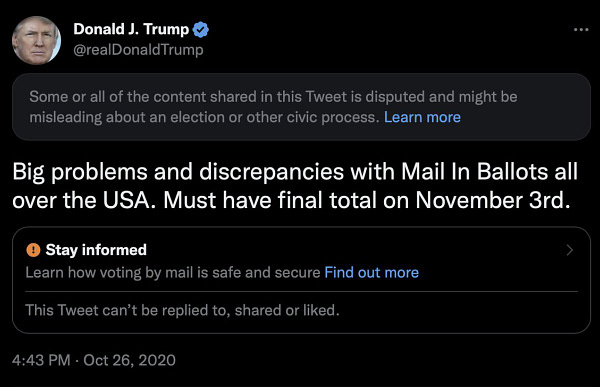
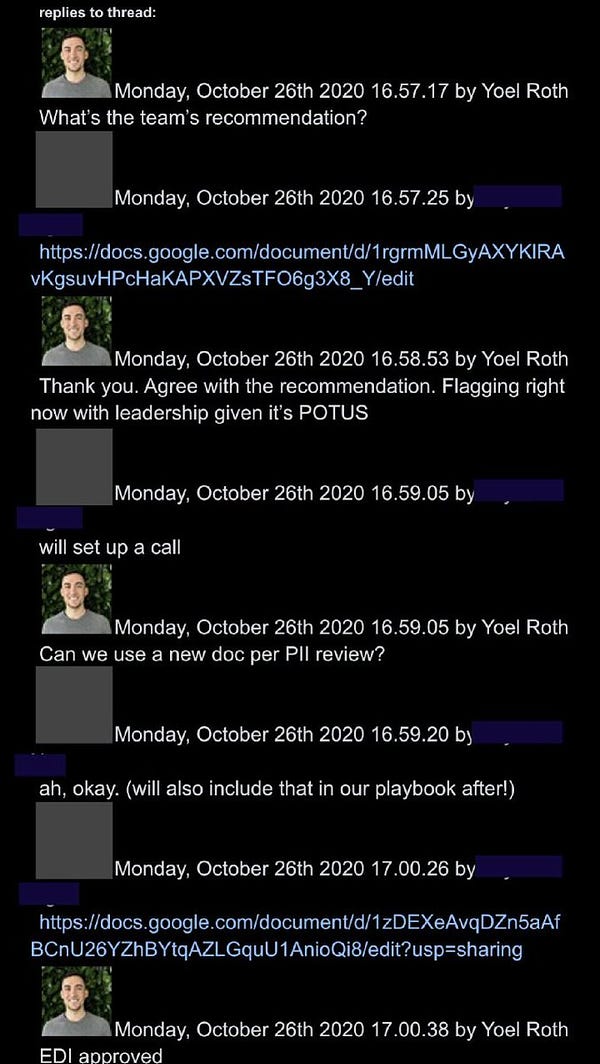
What Trump is saying is a) untrue, and b) discouraged people from voting using mail-in ballots, and c) has fed ongoing baseless fears about democracy in America that remain a real problem.
It is a big deal, no less so because Trump did this stuff all the time.
Twitter executives had long given Trump plenty of room for his lies. Here, they wrestled with what to do with this Tweet, consulting staff working in this area, and confirming with leadership. You might disagree with the process but it was not arbitrary.
Michael Shellenberger, who also cast doubt on the idea that Paul Pelosi was attacked for political reasons, is another blogger that Musk gave access to Twitter files. He wrote a whole thread about Trump’s treatment on Twitter. For example, it is a scandal the “Stop the Steal” messaging was de-amplified.

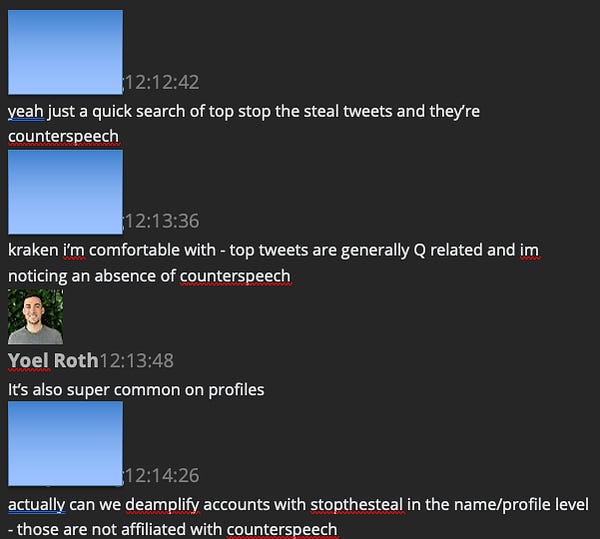
The #StopTheSteal messaging was again, based on a lie, and consequential for American democracy, providing a rallying point for those who sought to overturn a free and fair election. It was a very big deal. You have to discount all of this if you think think that the bigger scandal was that Twitter limited the spread of this message.
Shellenberger manages to frame Trump as being censored and then banned from Twitter as a scandal while not discussing what Trump did on January 6th. At points, this omission becomes comical, as when he points out that Twitter staff acknowledged they were making ad-hoc judgements as they wrestled with how to deal with a President on January 7th. Sounds bad. Any word on what happened on January 6th that pushed decisionmakers into ad-hoc processes?


The actual record on this is that Twitter anticipated (correctly) that Trump's engagement with the Proud Boys would trigger violence, but did not block him until after the violence actually occurred, until after an attempted coup failed. It was perhaps better than other social media companies in thinking about and moderating misinformation, but there was, and remains, plenty of it on the site.
QAnoning Twitter
As I’ve written elsewhere, we are seeing a QAnoning of our political discourse. In other words, public figures on the right are increasingly comfortable in accusing opponents as being somehow responsible for child sex abuse, regardless of the evidence. Musk is now one of those figures, at least when it comes to those criticizing him.
On December 7, three members of Twitter’s Trust and Safety Council resigned in protest about worsening conditions of hate speech on the site. Mike Cernovich, a hate speech trafficker who helped to create the original Pizzagate conspiracy theory, responded by accusing them of neglecting child porn to a criminal degree.
Musk sided with the conspiracist (he does this a lot) contradicting not just members of his Trust and Safety Council, but also former head of Twitter, Jack Dorsey, in the process.
Musk has said that removing child exploitation on twitter is his top priority. What has he actually done here? It’s hard to say. We know that the team working to monitoring and minimize child sexual abuse has been cut in half from 20 to 10. Regardless of his actions, his statements signal to QAnon or Q-adjacent followers that the elites are enabling child abuse, and that he will save the children. (The role of savior was one previously held by Trump in the QAnon narrative).
The general impression that Musk encourages is that his predecessors were indifferent to or even facilitated child exploitation to a criminal degree, but that he, finally, has addressed it with a wave of his hand.
Inconvenient critics can be reframed and dismissed using this narrative, relying on material provided by Musk’s far-right followers. For example, Musk has elevated comments noting that one of the members of the Safety Council who resigned is related to John Podesta, a character in the original Pizzagate conspiracy theory. Could it all be connected? he implies.
Yoel Roth, Twitter’s former Head of Trust & Safety stayed on to serve Musk and initially defended him, until the situation became untenable and he resigned. Since then he wrote a critical op-ed in the New York Times. The release of the Twitter Files has made him into a figure of right-wing hate. Musk also shared false claims based on out-of-context passages from Roth’s PhD thesis that he was comfortable with kids accessing adult services, or having sex with adults.
Critics of Musk, especially former Twitter officials, can expect a firehose of hate if they disagree with his evidence-free claims. This is the same strategy employed by every online troll calling people that disagree with them “groomer” over the last year.
Next up: Covid conspiracies
Musk is now boosting Covid conspiracism.
Prosecute Fauci? Like any public health official chasing a moving target, Anthony Fauci may have made errors, but in general he pushed an evidence-based approach to the pandemic, which often put him at odds with President Trump and Covid skeptics like Musk, who predicted that Covid would be over by April 2020. But Fauci has been a figure of hate on the right, and so now it’s his turn in the dock.
Lockdowns? The US, at a national level, never had one. Notably, Musk is silent about the real government-controlled lockdowns in China. Such criticism would conflict with his business interests there, and so instead he focuses on the the US, where he has the privilege of complaining about censorship without fear of government retaliation.
Musk has promised that the next Twitter Files drop will be about Covid. What can we expect from such a process? More of the same. More cherrypicked information by fellow conspiracy or culture war boosters, which ultimately show Twitter staff trying to balance free speech with other goals, such as limiting misinformation about a disease that killed many more Americans than it should have because so many believed that misinformation, and still do. He will refuse to share his disclosures with mainstream media, on the grounds they can’t be trusted, unlike him, and then complain when they do not pay enough attention to his concerns.
The future of Twitter? An exhausting, untrustworthy, firehose of misinformation
It is possible and even likely that Musk truly believes this stuff. Or that he is a shallow narcissist with no strong convictions who likes the attention he receives when he insults and mocks the less powerful. What Musk’s interaction with Vernon Unsworth suggest is that both possibilities can be true at the same time.
The difference is that now he owns the largest bullhorn in the world, and has found an adoring audience willing to applaud him every time reshapes Twitter to be the Newsmax of social media. He cannot simply own Twitter while sitting on the sidelines. He must be its hero. Instead, he is the character of the day, every day. The primary topic of Twitter is Musk and Twitter. This make the Twitter exhausting and less fun.
For all his talk of saving humanity, Musk has no deep set of principles he feels obliged to follow. Inconsistencies between statements and actions abound. For example, he demands silence and loyalty of Twitter employees even as he exposes them to public scorn. What he does seem to believe that he is an extraordinary visionary put on earth to defend civilization against existential threats. His belief in his own genius is such that he sees no need for a bothersome Content Moderation Council he once promised, or for outside actors who could lend some credibility to his efforts. As Ross Douthat suggests, Musk operates as a King, accountable only to himself. Without credible governing processes, Twitter is less trustworthy.
In the absence of credible processes, the far-right courtiers who flatter him exert an unhealthy influence on Twitter. To an even greater degree than before Twitter will become backward-looking, a museum to their past grievances, and vehicle to make every toxic culture war framing go viral. The possibility of moderating the worst excesses — as Twitter at least attempted for election or Covid conspiracy theories, or accusing people (especially members of the LGBTQ+ community) of being “groomers” — has gone. This makes Twitter a vector of misinformation and hate.
When Musk’s vision was directed toward making electric cars, his hubris could be overlooked and even applauded. When it was directed to space exploration, it had less immediate benefit, but still real value. When it is directed toward setting those project asides to mainstream conspiracy theories that damage democracy, civc trust and public health, we are all worse off.
